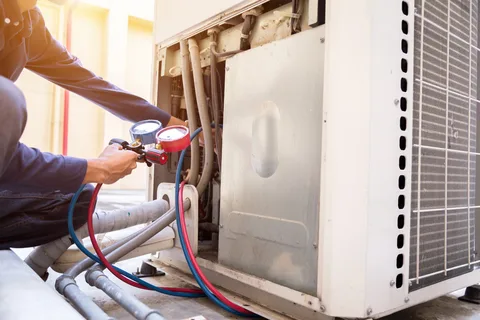Regular maintenance of heat pumps reduces repair costs by increasing your system’s energy efficiency, extending its lifespan, and helping to maintain warranty compliance. Routine checks and yearly professional inspections prevent small issues from escalating into major problems. A heat pump that receives regular maintenance and care offers optimal performance, lowers energy bills, and reduces your carbon footprint. This proactive approach minimizes stress on the system, prevents breakdown during peak demand, and ultimately saves money on future repairs so you can avoid unexpected disruptions in your daily life.
Tune up Today: Why Overlooking Heat Pump Maintenance Could Empty Your Wallet!
Are you noticing a performance decline from your heat pump, struggling to keep up but never quite reaching the desired temperature? Are you concerned about the rising energy bills, a constant hum, and cool drafts in autumn, despite higher thermostat settings? Maintaining your heat pump regularly can extend its lifespan and increase efficiency. Without regular maintenance, your system is more susceptible to sudden, unexpected breakdowns. The costs of emergency services and replacement parts can be a big dent in your monthly budget. Focus on regular heat pump maintenance to avoid higher repair costs in the long run.
Here is your guide to understanding how regular maintenance lowers repair bills and mastering heat pump upkeep.
- Preventing Major Repairs
Routine checkups can help prevent minor issues from escalating into major repairs, saving you money in the long run and preventing disruptions in your life. Regular maintenance results in:
Early problem detection
With regular maintenance and yearly professional inspections, you can identify minor issues such as any loose connections, dirty coils, or worn parts, which can be fixed easily before they lead to larger, more expensive breakdowns.
Reduced system stress
A well-maintained heat pump operates more efficiently and smoothly, reducing wear and tear on the components and preventing premature failures.
Avoidance of emergency services
Regular maintenance and services help prevent malfunctions, especially during the worst times (extreme hot or cold months), which can require costly emergency repairs.
| Did you know? According to IEA, electrifying heating with heat pumps can reduce global greenhouse gas (GHG) emissions by more than 500 million tonnes in 2030. |
- Boosting Efficiency and Longevity
Increased energy efficiency
Clean filters, coils, and properly functioning components allow the heat pump to work more efficiently, using less energy to heat or cool your home. Consistent performance results in lower energy bills over the span of your system’s life.
Extended system lifespan
By keeping the heart pump in optimal condition, you can significantly extend its overall lifespan, delaying the large expense to replace the entire unit.
- Increased Efficiency
Optimized system settings
During yearly inspections, technicians can adjust the settings to improve performance and ensure efficiency.
Safety checks
Regular safety checks ensure that your system is operating smoothly without posing any safety risks.
| Important fact! As of January 2025, all new residential air conditioners and heat pumps must utilize A2L refrigerants, which have a lower global warming potential (GWP). Older refrigerants like R-410 (likely the refrigerant used by your current system) are being phased out |
- Key Maintenance Tasks
- Regularly check and change the dirty filter to prevent strain on the system, reducing energy consumption and wear.
- Regularly inspect and clean the coils, which is crucial for maintaining the system’s ability to absorb and release heat effectively.
- Routine checks of electrical connections and components ensure safe and efficient operations.
- Clearing any debris or plants from around the outdoor unit allows for proper airflow, which is essential for the unit’s function.
Conclusion
Regular maintenance of your heat pump ensures system efficiency and its extended lifespan. With yearly professional inspections and proper care, you can reduce system stress and identify any minor issues that could escalate into major repairs if left undetected and unaddressed. Your heat pump system is susceptible to malfunctions and unexpected breakdowns without routine checks and annual tune-ups. With a proactive approach, you can avoid emergency costs and heat pump repairs, ensuring a well-functioning system providing year-round comfort and peace of mind.
FAQs
What is the new heat pump technology?
Variable-speed compressors are a noteworthy new heat pump technology. These types can adjust their speed, rather than cycling it on and off, allowing the unit to consume less energy and putting less strain on the system.
Are heat pumps environmentally friendly?
The lower energy consumption of heat pumps makes them environmentally friendly than traditional HVAC systems, offering an excellent choice for homeowners to reduce their carbon footprint.
What is the most efficient way to run a heat pump?
Set the thermostat between 19 – 21 degrees Celsius. Set the fan to auto mode to let it optimize its speed. Running the heat pump at 26 degrees Celsius will use 50% more power than at 21 degrees Celsius.


